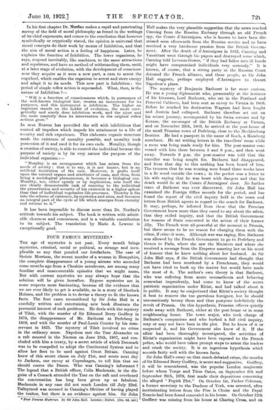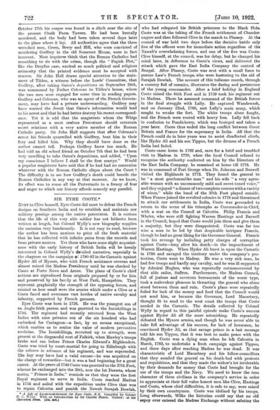FOUR FAMOUS MYSTERIES.•
THE age of mysteries is not past. Every month brings mysteries, criminal, social or political, as strange and inex- plicable as any that puzzled our forefathers. The case of Steinie Morrison, the recent murder of a woman in Hampshire, the complete disappearance of a young airman who ascended some months ago from a Cheshire aerodrome, are among many familiar and unaccountable episodes that we might name. But with current mysteries we may always hope that the solution will be given hereafter. Bygone mysteries are in some respects more fascinating, because all the evidence that we are ever likely to get is available, as in a story of Sherlock Holmes, and the problem is to devise a theory to fit the known facts. The four cases reconsidered by Sir John Hall in a carefully written and entertaining new book illustrate the perennial interest of such problems. He deals with the mystery of Tilsit, with the murder of Sir Edmund Berry Godfrey in 1678, the disappearance of Mr. Bathurst at Perleberg in 1809, and with the murder of Paul-Louis Courier by his man- servant in 1825. The mystery of Tilsit involved no crime in the ordinary sense. Napoleon met the Tsar Alexander on a raft moored in the Niemen on June 25th, 1807, and con- cluded with him a treaty, by a secret article of which Denmark was to be compelled to adopt the Continental System and to allow her fleet to be used against Great Britain. Canning knew of this secret clause on July 21st, and wrote next day to Jackson, our envoy at Copenhagen, to tell him that we should coerce the Danes. Who was Canning's informant ? The legend that a British officer, Colin Mackenzie, in the dis- guise of a Cossack attended the Tsar on the raft and overheard the conversation has long been given up as fabulous. Mackenzie in any case did not reach London till July 23rd. Talleyrand was accused in Canning's lifetime of having played the traitor, but there _is no evidence against him. Sir John • Four Farm,* Mysteries. By Sir John Hall. London : Nisbet. [10s. Od. net]
Hall makes the very plausible suggestion that the news reached Canning from the Russian Embassy through an old French spy, the Comte d'Antraigues, who is known to have been dis- missed soon afterwards from the Russian service and to have received a very handsome pension from the British Govern-
ment. After the death of d'Antraigues in 1812, Canning and Vansittart went through his papers and destroyed some which,
Canning told Leveson-Gower, " if they had fallen into ill hands might have compromised individuals very seriously." It is known, of course, that a strong party at the Russian Court
detested the French alliance, and these people, as Sir John Hall suggests, perhaps employed d'Antraigues to thwart Napoleon's plans.
The mystery of Benjamin Bathurst is far more curious. He was a young diplomatist who, presumably at the instance of his kinsman, Lord Bathurst, who sat in the Portland and Percoval Cabinets, had been sent as envoy to Vienna in 1809. Before he reached his • destination Wagram had been fought and Austria had collapsed. Bathurst therefore set out on his return journey, accompanied by his Swiss servant and by Krause, the messenger of the British Embassy at Vienna, and on November 25th, 1809, he arrived at the post-house of the small Prussian town of Perleberg, close to the Mecklenburg frontier. He had a passport in the name of Koch, a Hamburg merchant. He sat writing letters in the travellers' room while a room was being made ready for him. The post-master con- versed with him there between 5 and 6 p.m., and then went away. Towards 9 p.m. the post-master was told that the traveller was being sought for. Bathurst had disappeared, and from that day to this nothing has been heard of him. The trousers that he was wearing were found three weeks later in a fir wood outside the town ; in the pocket was a letter to his wife saying that he was beset with dangers and that his death would lie at the Comte d'Antraigues' door. No further trace of Bathurst was ever discovered. Sir John Hall has examined the Foreign Office records for the period, and has found the report of the civil inquiry held in the town and letters from British agents in regard to the search for Bathurst.
It may, perhaps, be inferred from these that the Prussian Government knew more than they cared to say about the affair, that they stifled inquiry, and that the British Government for reasons of State concurred in the action of their former Ally. The French were all-powerful at the moment in Prussia, but there seems to be no reason for charging them with the crime, if crime it were. Although war was raging, Mrs. Bathurst was allowed by the French Government to go to Perleberg and thence to Paris, where she saw the Ministers and where she
received a message from the Emperor assuring her on his word of honour that he knew nothing about her husband. As Sir
John Hall says, if the British Government had thought that Bathurst had been murdered by a Frenchman, they would not have tried to hush up the matter but would have made the most of it. The author's own theory is that Bathurst, who was suffering from acute neurasthenia and behaving somewhat imprudently, had come to know of the secret patriotic organization under Kleist, and had talked about it in public. It may be conjectured that Kleist's society thought it best to remove the too garrulous foreigner, lest he should unconsciously betray them and thus postpone indefinitely the revolt of Prussia. On this hypothesis, Prussian officers quietly made away with Bathurst, either at the post-house or in some neighbouring house. The town major, who took charge of Bathurst's companions and who burked a full civil inquiry, may or may not have been in the plot. But he know of it or suspected it, and his Government also knew of it. If the affair had been thoroughly investigated, the activities of Kleist's organization might have been exposed to the French police, who would have taken prompt steps to arrest the leaders and crush the society. It is an ingenious hypothesis which accords fairly well with the known facts.
Sir John Hall's essay on that much-debated crime, the murder of Sir Edmund Berry Godfrey, is acute and suggestive. Godfrey, it will be remembered, was the popular London magistrate before whom Tonge and Titus Oates, on September 6th and September 28th, 1678, first made their depositions concerning the alleged " Popish Plot." On October let, Father Coleman,
a former secretary to the Duchess of York, was arrested, after incriminating letters from the Pere la Chaise and the Papal Nuncio had been found concealed in his house. On October 12th Godfrey was missing from his house at Charing Cross, and on October 17th his corpse was found in a ditch near the site of the present Chalk Farm Tavern. He had been brutally murdered, and the body had been taken several days later to the place where it lay. All authorities agree that the three wretched men, Green, Berry and Hill, who were convicted of murdering Godfrey in the old Somerset House, were in fact innocent. Most inquirers think that the Roman Catholics had something to do with the crime, though the " Popish Plot," like the Dreyfus case, excited so much political and religious animosity that the printed evidence must be accepted with reserve. Sir John Hall draws special attention to the state- ment of Tilden, a witness before the Lords' Committee, that Godfrey, after taking Oates's depositions on September 28th, was summoned by Father Coleman to Tilden's house, where the two men were engaged for some time in reading papers. Godfrey and Coleman, who was an agent of the French Govern- ment, may have had a private understanding. Godfrey may have warned the Jesuit that Oates's information would lead to his arrest and that he had better destroy his recent correspond- ence. Yet it is odd that the magistrate whom the Whigs represented as a most zealous Protestant should entertain secret relations with a very active member of the Roman Catholic party. Sir John Hall suggests that after Coleman's arrest his friends quarrelled with Godfrey, beat him in their fury and killed him. Why they should have done so the author cannot tell. Perhaps Godfrey knew too much. He had told an old school friend on October 7th that he had been very unwilling to take Oates's depositions, and added, " Upon my conscience I believe I shall be the first martyr." Would a popular magistrate have said this if he had had no connexion whatever with the Roman Catholic clique about the Court ? The difficulty is to see how Godfrey's death could benefit the Roman Catholics in any way at that moment. As we know, its effect was to rouse all the Protestants to a frenzy of fear and anger to which our history affords scarcely any parallel.



































 Previous page
Previous page